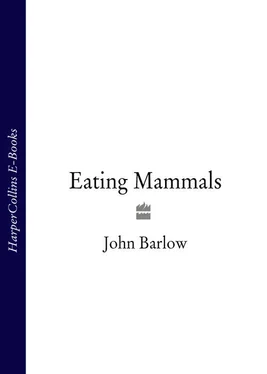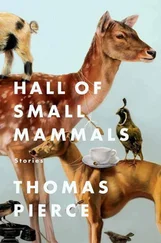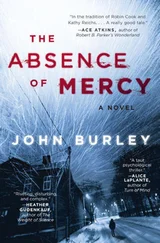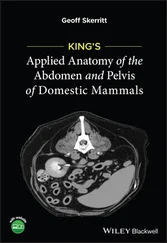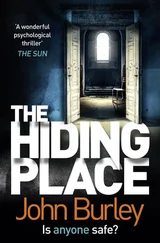The rumbling, masculine conversation out in the dining hall turned by degrees to a controlled, middle-class raucousness. They sang a song, or perhaps it was a hymn, it was hard to tell, and there were a few short speeches which were greeted with hearty approbation. Then The Great Michael ‘Cast Iron’ Mulligan was introduced, to a combination of polite applause and a good deal of muttering.
Suddenly, perhaps for the first time in years, the sundry magistrates and bank managers, the police officers and provincial lawyers assembled to celebrate their collective worth, were confronted with a man whose most evident baggage was a bunch of superlatives, enough to pour scorn on the very loudest boasts of English Freemasonry: the biggest man they had ever seen, almost certainly, and without doubt the handsomest giant; the most outrageous suit, and the most booming yet also the sweetest voice; the most confident, the most endearing, perhaps even the wittiest man they had ever encountered. And, of course, the most intimidating, whose great strength and power manifested itself at each moment, evident in the very slightest detail of his movement, in the way he would stand behind someone’s chair and rest an enormous hand delicately on that poor soul’s shoulder, and in the way he had of running his eyes casually up and down a whole row of men, as if to register in passing how, even en masse, they might consider it prudent to grant him their most careful respect. He was also, as far as any of them knew, the richest man in the room; not one of them would have failed to notice the Rolls-Royce outside, as they climbed out of their Morrises and Austins in twos and threes, or strode up from the bus stop, dicky bows peeping out above the collars of well-worn overcoats.
He began by praising his hosts for the splendour of their banquet, in that same lyrical tone which edged back and forth between seriousness and whimsy, and which, little by little, drew each diner up in his chair, stiff with expectancy, enthralled and rather embarrassed, yet unable to take his eyes off the great man. Mulligan himself wandered amongst them, stopping here and there to pluck a sugar lump from a table and pop it into his mouth. He recounted some of his more modest feats of ingestion, keeping it simple, letting each man present believe that he too could, just possibly, have eaten his way through a whole suckling pig, or four brace of pheasants; keeping it also within the bounds of human consumption, the six dozen oranges somewhere or other, the ninety-nine sardines, the gross of oysters (although he omitted the aftermath). I think for the main part he made these stories up; the Great Mulligan was no more likely to go to Seville to eat a paltry seventy-odd oranges as he was to go to the barber’s for a shoe shine. But he knew how to start, how to create atmosphere, taking and manipulating the assembled Masonic consciousness, running and developing it around the tempting notion of all-encompassing gluttony, as a great maestro takes a single theme and weaves from it a mesmerising sonata.
His discourse ran on and (it must be said) on. By subtle increments, though, he began to challenge even the most credulous before him, with tales of monstrous extravaganzas of consumption, of quantities measured not in numbers, but in numbers of crates and sackfuls.
The first snort of disbelief was heard quite suddenly, from the back of the room, and was followed immediately by the shuffling sound of an audience losing all faith in the act, the sound of embarrassment as a magician’s illusions are seen through, of a comedian’s jokes becoming hopelessly predictable. Mulligan played on this, indeed he appeared to relish it, and the louder the (still somewhat muted) cries of derision, the louder he talked above the noise, and the prouder and more outlandish his stories became. He laced his performance with a finely judged pathos. Waiting. Waiting for it.
‘Nonsense! Codswallop!’ came the full-voiced cry of contempt from some way off. Mulligan, caught mid-sentence, stopped and looked around to identify the source of the outburst. The room fell dead quiet, as forty-nine pairs of eyes watched one enormous, silent face move from shock to a hurt, childlike indigence, as if the Irishman had been found out, and his pathetic lies derided as the vulgar stuff of a fairground sideshow.
The chap who had voiced his doubts looked down into his coffee cup and shook his head, aware that, slowly, and without another word, the great man was approaching him. As luck would have it, the author of those first outspoken criticisms was a short, tubby fellow, rather red in the cheeks, and a true wobble-pot of inflated self-importance. When Mulligan got up to him, he bent down and whispered something in the man’s ear. Tubby got to his feet, cowering under Mulligan’s huge bulk.
‘This man,’ he boomed, standing behind his victim and draping both his arms ominously over the shoulders of the smaller man, ‘this man, gentlemen, believes me to be a liar.’
Stifled gasps as the dread word rang out around the hall, and Mulligan’s reverse bear hug tightened, so that the little chap’s ruddy cheeks turned purple.
‘A liar,’ Mulligan repeated, emphasising each syllable with a good, solid slap of his hand on the chest of the wilting individual caught up in his embrace. From the shadows at the back of the stage, where I was sitting, horrified and amazed in equal measure, I noted that those most proximate to Mulligan wore concerned expressions, trying with no success at all to treat the whole thing as a joke, whereas those further off appeared to find the scene wildly amusing, nudging each other and sniggering like schoolboys, although their animated delight was for the most part silent.
Then Mulligan’s face lit up. He broke out into the broadest smile and released the short, fat man. Spinning right around on his heels twice in uncontrollable joy, he announced: ‘I have a plan!’
More murmurs now from the tables, some of which seemed to indicate a resurgence of boredom and embarrassment with the act.
‘Sir,’ Mulligan continued, talking to the little man, ‘I cannot eat you’ (amusement all around). ‘No, we all have our standards’ (hoots of laughter), ‘but I can perhaps regain my honour. You will at least permit me that small favour?’
The man in question was too abashed to do anything other than nod. Mulligan cleared away a few plates and glasses from the place setting in front of him and, picking Tubby up like a child, sat him on the edge of the table, his little legs dangling down like a puppet’s. A concerned kind of laughter stirred around the hall, whilst Mulligan fussed about, apparently looking for something. He turned all of a sudden and, tripping over the vacant chair behind him, fell to the floor.
A few wisps of cruel laughter could be heard, and other diners looked on with pity. Further off conversations grew afresh, as if the act were already a rather tiresome irrelevance.
‘This is it!’ came a deafening cry from the ground. Everyone stared, but instead of Mulligan getting to his feet, they saw the chair rising slowly into the air. Then Mulligan stood up, the chair held high above his head. ‘This, my friend,’ he said, and brought the chair down, holding it right in front of the little man’s nose, ‘this is what I will eat tonight! I will eat your chair!’
With that he marched over to the stage, on to which there now fell some light, illuminating not only myself, but also the imposing form of The Machine, which lay shrouded in red velvet.
Inside my baggy dinner suit I prickled with sweat, desperate to get my part right, and at the same time feeling a certain complicity with Mulligan, who even now was tweaking and poking at the audience’s disbelief and mercilessly burlesquing the pity directed towards him only moments before.
Читать дальше
